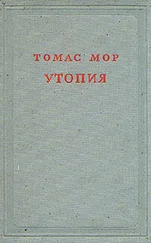Томас Мор - Utopia
Здесь есть возможность читать онлайн «Томас Мор - Utopia» — ознакомительный отрывок электронной книги совершенно бесплатно, а после прочтения отрывка купить полную версию. В некоторых случаях можно слушать аудио, скачать через торрент в формате fb2 и присутствует краткое содержание. Год выпуска: 2014, Издательство: epubBooks Classics, Жанр: Европейская старинная литература, Философия, Политика, на английском языке. Описание произведения, (предисловие) а так же отзывы посетителей доступны на портале библиотеки ЛибКат.
- Название:Utopia
- Автор:
- Издательство:epubBooks Classics
- Жанр:
- Год:2014
- ISBN:нет данных
- Рейтинг книги:4 / 5. Голосов: 1
-
Избранное:Добавить в избранное
- Отзывы:
-
Ваша оценка:
- 80
- 1
- 2
- 3
- 4
- 5
Utopia: краткое содержание, описание и аннотация
Предлагаем к чтению аннотацию, описание, краткое содержание или предисловие (зависит от того, что написал сам автор книги «Utopia»). Если вы не нашли необходимую информацию о книге — напишите в комментариях, мы постараемся отыскать её.
Utopia — читать онлайн ознакомительный отрывок
Ниже представлен текст книги, разбитый по страницам. Система сохранения места последней прочитанной страницы, позволяет с удобством читать онлайн бесплатно книгу «Utopia», без необходимости каждый раз заново искать на чём Вы остановились. Поставьте закладку, и сможете в любой момент перейти на страницу, на которой закончили чтение.
Интервал:
Закладка:
"If, I say, I should talk of these or such–like things to men that had taken their bias another way, how deaf would they be to all I could say!" "No doubt, very deaf," answered I; "and no wonder, for one is never to offer propositions or advice that we are certain will not be entertained. Discourses so much out of the road could not avail anything, nor have any effect on men whose minds were prepossessed with different sentiments. This philosophical way of speculation is not unpleasant among friends in a free conversation; but there is no room for it in the courts of princes, where great affairs are carried on by authority." "That is what I was saying," replied he, "that there is no room for philosophy in the courts of princes." "Yes, there is," said I, "but not for this speculative philosophy, that makes everything to be alike fitting at all times; but there is another philosophy that is more pliable, that knows its proper scene, accommodates itself to it, and teaches a man with propriety and decency to act that part which has fallen to his share. If when one of Plautus' comedies is upon the stage, and a company of servants are acting their parts, you should come out in the garb of a philosopher, and repeat, out of Octavia , a discourse of Seneca's to Nero, would it not be better for you to say nothing than by mixing things of such different natures to make an impertinent tragi–comedy? for you spoil and corrupt the play that is in hand when you mix with it things of an opposite nature, even though they are much better. Therefore go through with the play that is acting the best you can, and do not confound it because another that is pleasanter comes into your thoughts. It is even so in a commonwealth and in the councils of princes; if ill opinions cannot be quite rooted out, and you cannot cure some received vice according to your wishes, you must not, therefore, abandon the commonwealth, for the same reasons as you should not forsake the ship in a storm because you cannot command the winds. You are not obliged to assault people with discourses that are out of their road, when you see that their received notions must prevent your making an impression upon them: you ought rather to cast about and to manage things with all the dexterity in your power, so that, if you are not able to make them go well, they may be as little ill as possible; for, except all men were good, everything cannot be right, and that is a blessing that I do not at present hope to see." "According to your argument," answered he, "all that I could be able to do would be to preserve myself from being mad while I endeavoured to cure the madness of others; for, if I speak with, I must repeat what I have said to you; and as for lying, whether a philosopher can do it or not I cannot tell: I am sure I cannot do it. But though these discourses may be uneasy and ungrateful to them, I do not see why they should seem foolish or extravagant; indeed, if I should either propose such things as Plato has contrived in his 'Commonwealth,' or as the Utopians practise in theirs, though they might seem better, as certainly they are, yet they are so different from our establishment, which is founded on property (there being no such thing among them), that I could not expect that it would have any effect on them. But such discourses as mine, which only call past evils to mind and give warning of what may follow, leave nothing in them that is so absurd that they may not be used at any time, for they can only be unpleasant to those who are resolved to run headlong the contrary way; and if we must let alone everything as absurd or extravagant—which, by reason of the wicked lives of many, may seem uncouth—we must, even among Christians, give over pressing the greatest part of those things that Christ hath taught us, though He has commanded us not to conceal them, but to proclaim on the housetops that which He taught in secret. The greatest parts of His precepts are more opposite to the lives of the men of this age than any part of my discourse has been, but the preachers seem to have learned that craft to which you advise me: for they, observing that the world would not willingly suit their lives to the rules that Christ has given, have fitted His doctrine, as if it had been a leaden rule, to their lives, that so, some way or other, they might agree with one another. But I see no other effect of this compliance except it be that men become more secure in their wickedness by it; and this is all the success that I can have in a court, for I must always differ from the rest, and then I shall signify nothing; or, if I agree with them, I shall then only help forward their madness. I do not comprehend what you mean by your 'casting about,' or by 'the bending and handling things so dexterously that, if they go not well, they may go as little ill as may be;' for in courts they will not bear with a man's holding his peace or conniving at what others do: a man must barefacedly approve of the worst counsels and consent to the blackest designs, so that he would pass for a spy, or, possibly, for a traitor, that did but coldly approve of such wicked practices; and therefore when a man is engaged in such a society, he will be so far from being able to mend matters by his 'casting about,' as you call it, that he will find no occasions of doing any good—the ill company will sooner corrupt him than be the better for him; or if, notwithstanding all their ill company, he still remains steady and innocent, yet their follies and knavery will be imputed to him; and, by mixing counsels with them, he must bear his share of all the blame that belongs wholly to others.
"It was no ill simile by which Plato set forth the unreasonableness of a philosopher's meddling with government. 'If a man,' says he, 'were to see a great company run out every day into the rain and take delight in being wet—if he knew that it would be to no purpose for him to go and persuade them to return to their houses in order to avoid the storm, and that all that could be expected by his going to speak to them would be that he himself should be as wet as they, it would be best for him to keep within doors, and, since he had not influence enough to correct other people's folly, to take care to preserve himself.'
"Though, to speak plainly my real sentiments, I must freely own that as long as there is any property, and while money is the standard of all other things, I cannot think that a nation can be governed either justly or happily: not justly, because the best things will fall to the share of the worst men; nor happily, because all things will be divided among a few (and even these are not in all respects happy), the rest being left to be absolutely miserable. Therefore, when I reflect on the wise and good constitution of the Utopians, among whom all things are so well governed and with so few laws, where virtue hath its due reward, and yet there is such an equality that every man lives in plenty—when I compare with them so many other nations that are still making new laws, and yet can never bring their constitution to a right regulation; where, notwithstanding every one has his property, yet all the laws that they can invent have not the power either to obtain or preserve it, or even to enable men certainly to distinguish what is their own from what is another's, of which the many lawsuits that every day break out, and are eternally depending, give too plain a demonstration—when, I say, I balance all these things in my thoughts, I grow more favourable to Plato, and do not wonder that he resolved not to make any laws for such as would not submit to a community of all things; for so wise a man could not but foresee that the setting all upon a level was the only way to make a nation happy; which cannot be obtained so long as there is property, for when every man draws to himself all that he can compass, by one title or another, it must needs follow that, how plentiful soever a nation may be, yet a few dividing the wealth of it among themselves, the rest must fall into indigence. So that there will be two sorts of people among them, who deserve that their fortunes should be interchanged—the former useless, but wicked and ravenous; and the latter, who by their constant industry serve the public more than themselves, sincere and modest men—from whence I am persuaded that till property is taken away, there can be no equitable or just distribution of things, nor can the world be happily governed; for as long as that is maintained, the greatest and the far best part of mankind, will be still oppressed with a load of cares and anxieties. I confess, without taking it quite away, those pressures that lie on a great part of mankind may be made lighter, but they can never be quite removed; for if laws were made to determine at how great an extent in soil, and at how much money, every man must stop—to limit the prince, that he might not grow too great; and to restrain the people, that they might not become too insolent—and that none might factiously aspire to public employments, which ought neither to be sold nor made burdensome by a great expense, since otherwise those that serve in them would be tempted to reimburse themselves by cheats and violence, and it would become necessary to find out rich men for undergoing those employments, which ought rather to be trusted to the wise. These laws, I say, might have such effect as good diet and care might have on a sick man whose recovery is desperate; they might allay and mitigate the disease, but it could never be quite healed, nor the body politic be brought again to a good habit as long as property remains; and it will fall out, as in a complication of diseases, that by applying a remedy to one sore you will provoke another, and that which removes the one ill symptom produces others, while the strengthening one part of the body weakens the rest." "On the contrary," answered I, "it seems to me that men cannot live conveniently where all things are common. How can there be any plenty where every man will excuse himself from labour? for as the hope of gain doth not excite him, so the confidence that he has in other men's industry may make him slothful. If people come to be pinched with want, and yet cannot dispose of anything as their own, what can follow upon this but perpetual sedition and bloodshed, especially when the reverence and authority due to magistrates falls to the ground? for I cannot imagine how that can be kept up among those that are in all things equal to one another." "I do not wonder," said he, "that it appears so to you, since you have no notion, or at least no right one, of such a constitution; but if you had been in Utopia with me, and had seen their laws and rules, as I did, for the space of five years, in which I lived among them, and during which time I was so delighted with them that indeed I should never have left them if it had not been to make the discovery of that new world to the Europeans, you would then confess that you had never seen a people so well constituted as they." "You will not easily persuade me," said Peter, "that any nation in that new world is better governed than those among us; for as our understandings are not worse than theirs, so our government (if I mistake not) being more ancient, a long practice has helped us to find out many conveniences of life, and some happy chances have discovered other things to us which no man's understanding could ever have invented." "As for the antiquity either of their government or of ours," said he, "you cannot pass a true judgment of it unless you had read their histories; for, if they are to be believed, they had towns among them before these parts were so much as inhabited; and as for those discoveries that have been either hit on by chance or made by ingenious men, these might have happened there as well as here. I do not deny but we are more ingenious than they are, but they exceed us much in industry and application. They knew little concerning us before our arrival among them. They call us all by a general name of 'The nations that lie beyond the equinoctial line;' for their chronicle mentions a shipwreck that was made on their coast twelve hundred years ago, and that some Romans and Egyptians that were in the ship, getting safe ashore, spent the rest of their days amongst them; and such was their ingenuity that from this single opportunity they drew the advantage of learning from those unlooked–for guests, and acquired all the useful arts that were then among the Romans, and which were known to these shipwrecked men; and by the hints that they gave them they themselves found out even some of those arts which they could not fully explain, so happily did they improve that accident of having some of our people cast upon their shore. But if such an accident has at any time brought any from thence into Europe, we have been so far from improving it that we do not so much as remember it, as, in aftertimes perhaps, it will be forgot by our people that I was ever there; for though they, from one such accident, made themselves masters of all the good inventions that were among us, yet I believe it would be long before we should learn or put in practice any of the good institutions that are among them. And this is the true cause of their being better governed and living happier than we, though we come not short of them in point of understanding or outward advantages." Upon this I said to him, "I earnestly beg you would describe that island very particularly to us; be not too short, but set out in order all things relating to their soil, their rivers, their towns, their people, their manners, constitution, laws, and, in a word, all that you imagine we desire to know; and you may well imagine that we desire to know everything concerning them of which we are hitherto ignorant." "I will do it very willingly," said he, "for I have digested the whole matter carefully, but it will take up some time." "Let us go, then," said I, "first and dine, and then we shall have leisure enough." He consented; we went in and dined, and after dinner came back and sat down in the same place. I ordered my servants to take care that none might come and interrupt us, and both Peter and I desired Raphael to be as good as his word. When he saw that we were very intent upon it he paused a little to recollect himself, and began in this manner:—
Читать дальшеИнтервал:
Закладка:
Похожие книги на «Utopia»
Представляем Вашему вниманию похожие книги на «Utopia» списком для выбора. Мы отобрали схожую по названию и смыслу литературу в надежде предоставить читателям больше вариантов отыскать новые, интересные, ещё непрочитанные произведения.
Обсуждение, отзывы о книге «Utopia» и просто собственные мнения читателей. Оставьте ваши комментарии, напишите, что Вы думаете о произведении, его смысле или главных героях. Укажите что конкретно понравилось, а что нет, и почему Вы так считаете.








